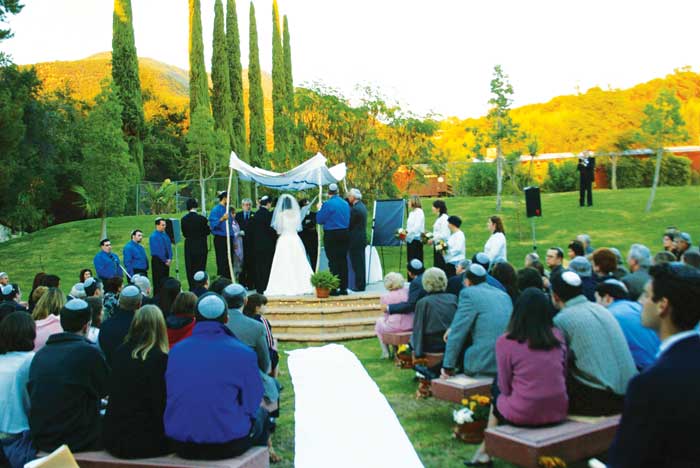
Stapleton residents David and Lauren Ross met at a camp reunion and married at their camp in Los Angeles. The weekend included a packed itinerary of camp activities—basketball and softball games, bike rides, a talent show, movies, and a hike. (photos courtesy of David and Lauren Ross)
As teenagers, Lauren and David Ross unknowingly worked at the same camp for two summers outside of Los Angeles. Ten years later at a camp reunion, the couple—now Stapleton residents—met and spent the weekend with a group of friends at a big cabin. They say it was during their time at camps that they met some of their best friends and experienced some of their fondest memories.
“Camp life is what brought us together,” Lauren says.
David spent 25 summers at camp and was referred to as a “staff rat,” or the kid of a staff person—his dad was the camp therapist. He later worked as the music director of a camp. Lauren got into camp life not as a camper but as a counselor, including working at camps in Mississippi, Texas and California.
“They always say that one day in camp is like a year outside of camp because you’re so enmeshed in each other’s lives. It’s just this whole culture. When you have the same experiences, it’s like growing up together,” David says.
The couple loved camp so much they got married at their camp in LA—their “best camp memory.” They invited family and friends for a weekend of camp activities including basketball and softball games, bike rides, a talent show, movies, and a hike.
What is it about the camp experience that fosters lifelong memories and an almost tribal group of friends? What is the value of going to camp? What are some of the best memories?
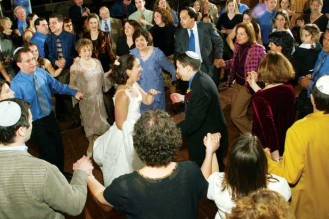 Ninety percent of Lauren and David’s friends today they know from camp. On the last day of camp, people clung to each other crying. “They’d say, ‘Oh, my god, I’m going to miss you and you’re my best friend,’” Lauren says and laughs. Looking back on camp memories, they laugh at the practical jokes. Lauren recalls the most powerful and cruel joke from her time as a counselor. A few of the older campers received the sixth Harry Potter book before everyone else who anxiously awaited their copy in the mail.
Ninety percent of Lauren and David’s friends today they know from camp. On the last day of camp, people clung to each other crying. “They’d say, ‘Oh, my god, I’m going to miss you and you’re my best friend,’” Lauren says and laughs. Looking back on camp memories, they laugh at the practical jokes. Lauren recalls the most powerful and cruel joke from her time as a counselor. A few of the older campers received the sixth Harry Potter book before everyone else who anxiously awaited their copy in the mail.
The first camper who read the book wrote in toilet paper, “Snape Killed Dumbledore” and hung it above the dining hall for all to see. “Everyone started bawling,” Lauren says.
This summer, Lauren and David dropped off their 8-year-old daughter for her first 3-week long camp in Austin. During a week-long session last summer, counselors sent Lauren and David photos of her looking bewildered and teary getting off the bus, but by the end of the trip she raved about camp and insisted she had to go for the longer session.
Stapleton resident and child psychologist at Children’s Hospital Colorado Mindy Solomon says camp helps build independence, resiliency and confidence among kids. Although outgoing kids may naturally thrive quicker, she thinks many different personalities can do well at camp. Ultimately, a child’s adaptability matters more than personality, she says. “If a kid is used to being rescued or having a bad feeling that’s instantly solved for them, they may not do as well at camp.” She encourages parents to research and find a camp that’s a good fit. “It’s also important to remember that it’s not going to damage your child if they spend a week being unhappy. If it’s not a good experience, they can come home, learn from it, and don’t have to do it again.”
When she thinks about her time at camp, she gets a nostalgia she doesn’t get from anything else. She went to camp outside of LA for nine summers. “You’re so far removed from everything else that is normal,” she says. “You kind of create this little summer family.” She particularly remembers the funny traditions of camp like singing while waiting in line at the dining hall. Scott Fuhrman, the camper with the most mail in camp history, would undoubtedly receive a letter every mail call and everyone would chant, “Scott Fuhrman!”
Stapleton resident Miriam Ritter, 15, says one of the really special things about camp is no social media. “You don’t have your phone, or anything and don’t care what’s going on outside.” She says her 8 years at camp has made her more open-minded and confident. She’s learned to accept her quirks and totally be herself. One of her favorite times at camp was a 10-day backpacking trip at camp when they pet wolves at Mission: Wolf, a nonprofit educational wolf sanctuary.
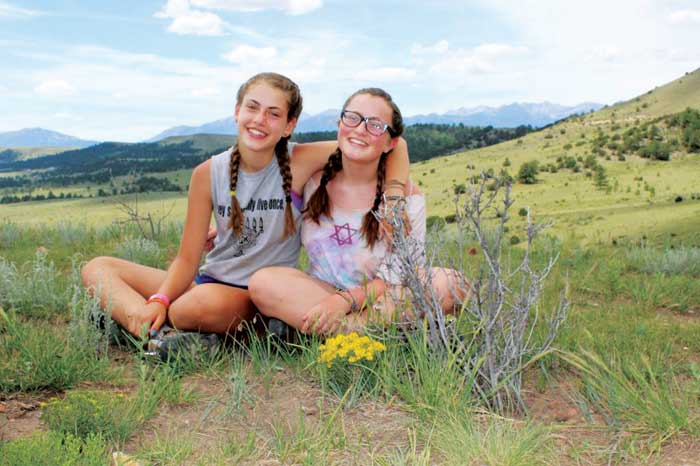
Scenes from Stapleton resident Miriam Ritter’s life at camp.
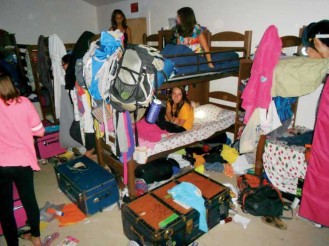
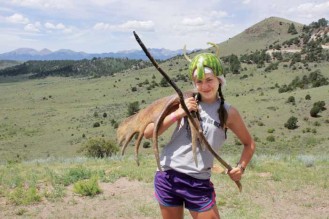 Rosa Pearlman, 23, went to camp for 13 years, including four summers as a counselor. She says anything you can imagine that’s fun happens at camp. Arts and crafts, ninja acrobats, mountain biking and rock climbing are some she lists. “I kind of want to go to camp forever,” she says. “When I was a little kid, I used to say that I was going to be the director of a camp so I never had to leave.”
Rosa Pearlman, 23, went to camp for 13 years, including four summers as a counselor. She says anything you can imagine that’s fun happens at camp. Arts and crafts, ninja acrobats, mountain biking and rock climbing are some she lists. “I kind of want to go to camp forever,” she says. “When I was a little kid, I used to say that I was going to be the director of a camp so I never had to leave.”
Weird things were always happening at her camp. Each year they had a relay race with challenges like chugging a can of soda and burping the alphabet, covering your body in whipped cream and doing 10 pushups, and planting your face in maple syrup followed by powdered sugar.
She has fond memories of counselors breaking the rules to make her feel special and cool, like sneaking into the kitchen to steal cookie dough. As a counselor, she distinctly remembers the first night of camp. They typically didn’t get sleep because they were comforting crying campers, some of whom wrote home begging to return. Pearlman says homesickness usually passes, and kids will even fake being homesick for attention, which she calls a very annoying habit.
“Being a counselor you learn how to have actual counseling skills for kids. They will freak out because they’re not used to being away from home,” she says.
One of her best memories as a counselor was visiting an Arapaho sweat lodge during a camping trip with 15-year-olds. The tent was so hot it was difficult to think, almost in a spiritual way. The tribe allowed the campers to say something if they wanted. “One of my 15-year-old boys said a prayer, beautiful words of thanks and peace for the world. It was so touching. I was so proud,” she says.
Siblings and Stapleton residents Agnes, 12, and Clifford Brown, 10, went to camp for the first time this year—Agnes in West Virginia and Clifford in Minnesota. Neither of them got homesick. Both were slightly nervous beforehand, but they had so much fun the feeling dissolved quickly.
For two weeks, Agnes rode horses and did arts and crafts; Clifford went paddle boarding, climbing, and did archery. “I like that you got to choose the activities, and you got to do them, and they were all unique,” Clifford says. He says he became more respectful because of camp. “I would tell a nervous camper that it’s really fun, and they should go just to try it out. You have too much fun to be homesick,” Agnes says.
On the last day of Agnes’s camp, they held a candle ceremony at night. Every camper had a candle with their name, which they put in the river and watched it float away. Both Agnes and Clifford plan to return to camp next year and be counselors someday.
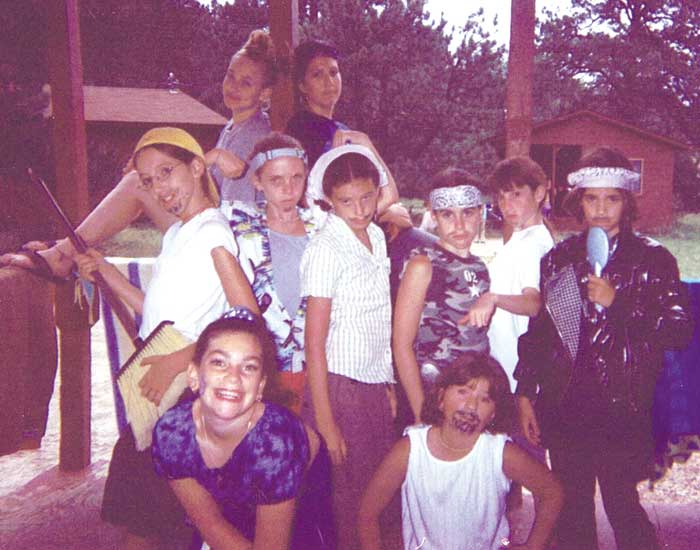
Rosa (center) and a group of friends at camp dress up as a motorcycle gang. “We were always doing weird things at camp, including cross-dressing pretty frequently,” she says.




0 Comments